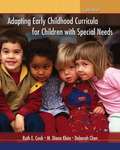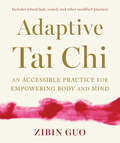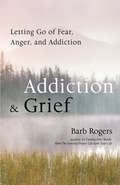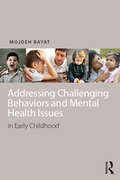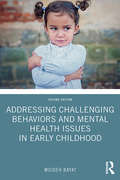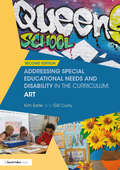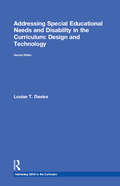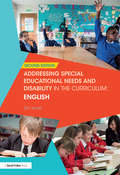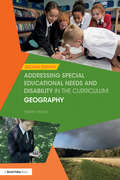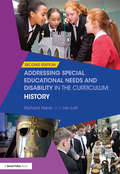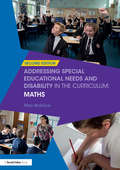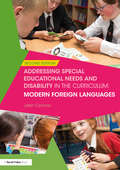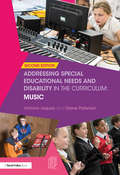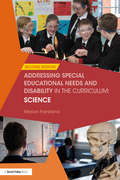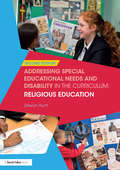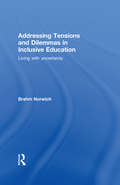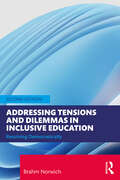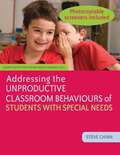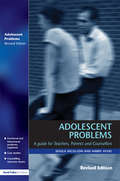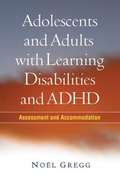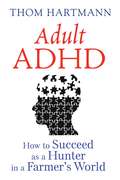- Table View
- List View
Adapting Early Childhood Curricula for Children with Special Needs (Eighth Edition)
by Deborah Chen Ruth E. Cook M. Diane KleinThe book focuses on a blend of developmental and learning theories, with practical suggestions for delivery of services to young children with special needs and their families.
Adaptive Tai Chi: An Accessible Practice for Empowering Body and Mind
by Zibin GuoA simple and inclusive Tai Chi program, completely modifiable with helpful illustrations, that empowers people of all physical abilities to experience the transformative qualities of this art. Includes sequences for standing/moving, stationary standing, seated, and wheelchair.In Tai Chi Chuan, the traditional Chinese martial and healing art, we learn to overcome challenges by empowering the mind and transforming the body. Adaptive Tai Chi offers an innovative approach that speaks to this powerful idea and makes Tai Chi accessible and beneficial to people with a range of physical conditions or ambulatory impairment.The slow, circular, flowing, and graceful movements of Tai Chi require little space and no equipment, making it an ideal practice for people with different physical abilities (it&’s been included in the Paralympics since 2008). Adaptive Tai Chi introduces readers to the culture, philosophy, and physiology of Tai Chi—and gives readers four completely illustrated practices, each modified for different physical abilities, including conventional standing/moving, stationary standing, seated, and wheelchair sequences.Along with the complete illustrated adaptive Tai Chi sequences, Guo includes notes and philosophical insights into each practice. The complete program offered in Adaptive Tai Chi allows everyone to access the profound benefits of Tai Chi practice.
Addiction & Grief: Letting Go of Fear, Anger, and Addiction
by Barb RogersEmotional Recovery From AddictionAuthentic recovery is more than an attitude. It is based on emotional work that involves an honest appraisal of one's life. It is through dealing with unresolved feelings of grief and anger that one can truly heal from addiction.The emotional “bottom” of recovery. Just as one needs to hit bottom with drinking or using in order to begin recovery, eventually one will also hit an emotional “bottom” of fear, anger, and grief. And recovery can only start by first understanding how, when, and where those emotions took control. Author Barb Rogers challenges readers in recovery to investigate the unresolved grief and loss in their lives and helps readers navigate the impacts of those emotions—emotions that can lead back to using if not resolved.Finding healing and happiness. Recovery from addictions involves more than getting sober. It involves finding happiness, which can only happen if the emotional work is done as well. Negative emotions have the ability to weigh on us and influence both our decisions and the way we handle life’s challenges. If we continue to live with fear, anger, and grief, we aren’t really free from our addictions. The steps to recovery—authentic and complete recovery—involve healing from the deeper issues in our life. Learn more about:The emotional healing that goes hand-in-hand with addiction recoveryDealing with grief and resolving underlying issuesHow to find happiness after getting soberIf you learned from books like This Naked Mind, Rewired, The Mindfulness Workbook for Addiction, or A Gentle Path Through the Twelve Steps, then you’ll want to read Addiction & Grief.
Addressing Challenging Behaviors and Mental Health Issues in Early Childhood
by Mojdeh BayatA copublication with the Council for Exceptional Children (CEC), Addressing Challenging Behaviors and Mental Health Issues in Early Childhood focuses on research-based strategies for educators to address challenging behaviors of children during early childhood and elementary school years. Utilizing research from the fields of neuroscience, child development, child psychiatry, counselling and applied behavior analysis, the author suggests simple strategies for teachers to manage behaviors and promote mental health and resilience in children with challenging behaviors. Addressing Challenging Behaviors and Mental Health Issues in Early Childhood provides a framework for best practices which are empirically based and have been successfully utilized in the classroom. An appreciation of the deep understanding of culture as it affects curricular approaches, family engagement, and child growth and development is utilized throughout this comprehensive, multidisciplinary resource. Bayat references the most recent research in the field of child mental health and provides educational and intervention approaches that are appropriate for all children with and without disabilities.
Addressing Challenging Behaviors and Mental Health Issues in Early Childhood
by Mojdeh BayatNow in a fully updated second edition, this essential volume provides research-based strategies to help educators address challenging behaviors in early childhood and elementary years. Drawing on research and approaches from the fields of neuroscience, child development, child psychiatry, counseling, and applied behavior analysis, this text offers teachers simple strategies to manage behaviors and promote mental health and resilience in young children. Thoroughly updated to reflect new developments in neuroscience, trauma, and physical and mental health, this second edition also features an entirely new chapter on classroom approaches in child mental health, including the interaction of technology with challenging behaviors and mental health issues. Comprehensive, multidisciplinary, and culturally responsive, this critical resource provides new and experienced educators and coaches with educational and intervention approaches that are appropriate for all children, with and without disabilities.
Addressing Special Educational Needs and Disability in the Curriculum: Art (Addressing SEND in the Curriculum)
by Kim Earle Gill CurryThe SEND Code of Practice (2015) reinforced the requirement that all teachers must meet the needs of all learners. This topical book provides practical, tried and tested strategies and resources that will support teachers in making art lessons accessible and interesting for all pupils, including those with special needs. The authors draw on a wealth of experience to share their understanding of special educational needs and disabilities and show how the art teacher can reduce or remove any barriers to learning. Offering strategies that are specific to the context of art teaching, this book will enable teachers to: develop students’ understanding, appreciation and enjoyment of art and design; advance students’ sense of enquiry about visual and tactile experiences; help pupils to realise their creative intentions, through the development of technical competence and manipulative skills; provide opportunities for personal and imaginative enquiry; sample a variety of art and design projects to use in their own lessons; plan the classroom layout and display to enhance learning; successfully train, and fully use the support of, their teaching assistants. An invaluable tool for continuing professional development, this text will be essential for secondary art teachers (and their teaching assistants) seeking guidance specific to teaching art to all pupils, regardless of their individual needs. The book will also be of interest to secondary SENCOs, senior management teams and ITT providers. Full of practical ideas and inspiration, and supported by free online resources, this is an essential tool for art teachers and teaching assistants and will help to deliver successful, inclusive lessons for all pupils.
Addressing Special Educational Needs and Disability in the Curriculum: Design And Technology (Addressing SEND in the Curriculum)
by Louise T. DaviesThe SEND Code of Practice (2015) reinforced the requirement that all teachers must meet the needs of all learners. This topical book provides practical, tried-and-tested strategies and resources that will support teachers in making design and technology lessons accessible and interesting for all pupils, including those with special educational needs. The author draws on a wealth of experience to share her understanding of special educational needs and disabilities and show how the design and technology teacher can reduce or remove any barriers to learning. Offering strategies that are specific to the context of design and technology teaching, this book will enable teachers to: better identify a student’s particular learning requirements; set inclusive design and making assignments which allow all students to participate and succeed; build students’ confidence in using a range of materials and tools; assist with design tasks where pupils take ownership of their work and learning; adapt the classroom environment to meet the needs of pupils; create a mutually supportive classroom which maximises learning opportunities. An invaluable tool for continuing professional development, this text will be essential for design and technology teachers (and their teaching assistants) seeking to include and motivate all pupils in their lessons, regardless of their individual needs. This book will also be of interest to secondary SENCOs, senior management teams and ITT providers. In addition to free online resources, a range of appendices provide design and technology teachers with a variety of pro forma and activity sheets to support effective teaching. This is an essential tool for design and technology teachers and teaching assistants, and will help to deliver successful, inclusive lessons for all pupils.
Addressing Special Educational Needs and Disability in the Curriculum: English (Addressing SEND in the Curriculum)
by Tim HurstThis book provides practical strategies and resources that have been proven effective in teaching English to pupils of all abilities, making English accessible, challenging and exciting. The author outlines important key principles that should underpin teaching and learning so that all pupils, including those with special educational needs, can enjoy the subject and make outstanding progress. The ideas and guidance draw on a wealth of experience, providing classroom activities and free online resources, which can be combined with different teaching approaches. A range of appendices provides teachers with real-life case studies and examples and templates for supporting pupils with SEND. Offering strategies that are specific to the context of English teaching, this book will enable teachers and their teaching assistants to: develop pupils’ understanding by engaging multi-sensory approaches; ensure all pupils are able to participate fully in lessons and achieve success; design and use individual plans for pupils with SEND; assess and adapt content and resources when differentiating materials for pupils with a wide range of learning needs; use formative assessments to measure learning and inform planning. An invaluable tool for whole-school continuing professional development, this fully revised text will be essential for teachers and their teaching assistants seeking guidance specific to teaching English to all pupils, regardless of their individual needs. This book will also be of interest to SENDCOs, learning support units and senior management teams as well as to teacher-training professionals.
Addressing Special Educational Needs and Disability in the Curriculum: Geography (Addressing SEND in the Curriculum)
by Helen HarrisThe SEND Code of Practice (2015) reinforced the requirement that all teachers must meet the needs of all learners. This topical book provides practical, tried and tested strategies and resources that will support teachers in making geography lessons accessible and interesting for all pupils, including those with special needs. The author draws on a wealth of experience to share her understanding of individual needs and show how the geography teacher can reduce or remove any barriers to learning. Offering strategies that are specific to the context of geography teaching, this book will enable teachers to: ensure all pupils are able to participate in every lesson; provide inclusive fieldwork opportunities that take into consideration the needs of all pupils; use formative assessments to measure learning and inform planning; plan the classroom layout and display to enhance learning; successfully use the support of their teaching assistants. An invaluable tool for continuing professional development, this text will be essential for middle school and secondary geography teachers (and their teaching assistants) who are committed to creating an inclusive learning environment for all pupils, regardless of their individual needs. The book will also be of interest to SENCOs and inclusion managers, curriculum co-ordinators, senior management teams and ITT providers. Full of practical ideas and inspiration, and supported by free online resources, this is an essential tool for geography teachers and teaching assistants who want to deliver successful, inclusive lessons for all pupils.
Addressing Special Educational Needs and Disability in the Curriculum: History (Addressing SEND in the Curriculum)
by Richard Harris Ian LuffThe SEND Code of Practice (2015) has reinforced the requirement that all teachers must meet the needs of all learners. This topical book provides practical, tried and tested strategies and resources that will support teachers in making history lessons accessible and exciting for all pupils, including those with special needs. The authors draw on a wealth of experience to share their understanding of special educational needs and disabilities and show how the history teacher can reduce or remove any barriers to learning. Offering strategies that are specific to the context of history teaching, this fully revised edition will enable teachers to: Make history education accessible and engaging to pupils of all abilities Create an inclusive classroom environment that responds to the emotional needs of the class and nurtures a culture of learning Develop inclusive practical demonstration and role play techniques to aid conceptual understanding Set assessment objectives Deploy in-class support effectively An invaluable tool for continuing professional development, this text will be essential for teachers (and their teaching assistants) seeking guidance specific to teaching history to all pupils, regardless of their individual needs. This book will also be of interest to SENDCOs, senior management teams and ITT providers. In addition to practical activities and supporting material contained in the book, there are also free online resources for readers to download and use in the preparation of successful, inclusive lessons for all pupils.
Addressing Special Educational Needs and Disability in the Curriculum: Maths (Addressing SEND in the Curriculum)
by Max WallaceThe SEND Code of Practice (2015) reinforced the requirement that all teachers must meet the needs of all learners. This topical book provides practical, tried and tested strategies and resources that will support teachers in making maths lessons accessible and interesting for all pupils, including those with special needs. The author draws on a wealth of experience to share his understanding of special educational needs and disabilities and show how the maths teacher can reduce or remove any barriers to learning. Offering strategies that are specific to the context of maths teaching, this book will enable teachers to: adopt a ‘problem solving’ approach to ensure students use and apply mathematics at all times during their learning develop students’ understanding of mathematical ideas structure lessons to empower and actively engage students create a mutually supportive classroom which maximises learning opportunities plan the classroom layout and display to enhance learning, for example displaying number lines, vocabulary lists and pupils’ work successfully train and fully use the support of their teaching assistants. An invaluable tool for continuing professional development, this text will be essential for secondary maths teachers (and their teaching assistants) seeking guidance specific to teaching maths to all pupils, regardless of their individual needs. This book will also be of interest to secondary SENCOs, senior management teams and ITT providers. In addition to free online resources, a range of appendices provide maths teachers with a variety of pro forma and activity sheets to support effective teaching. This is an essential tool for maths teachers and teaching assistants, and will help to deliver successful, inclusive lessons for all pupils.
Addressing Special Educational Needs and Disability in the Curriculum: Modern Foreign Languages (Addressing SEND in the Curriculum)
by John ConnorThe SEND Code of Practice has reinforced the requirement that all teachers must meet the needs of all learners. This book provides practical, tried and tested strategies and resources that will support teachers in making modern foreign languages accessible, challenging and exciting for all pupils, including those with special needs. The author draws on a wealth of experience to share his understanding of how SEND can affect learning and how the MFL teacher can reduce or remove any barriers to learning. Offering strategies that are specific to the context of MFL teaching, this book will enable teachers to: ensure all pupils are able to participate fully in every lesson; develop pupils’ understanding, motivation and enjoyment; adapt content and resources when differentiating materials for pupils with a wide range of learning needs; use formative assessments to measure learning. An invaluable tool for whole-school continuing professional development, this text will be essential for teachers (and their teaching assistants) seeking guidance specific to teaching languages to all pupils, regardless of their individual needs. This book will also be of interest to SENCOs, senior management teams and ITT providers.
Addressing Special Educational Needs and Disability in the Curriculum: Music (Addressing SEND in the Curriculum)
by Diane Paterson Victoria JaquissThe SEND Code of Practice (2015) has reinforced the requirement that all teachers must meet the needs of all learners. This topical book provides practical, tried and tested strategies and resources that will support teachers in making music lessons accessible and exciting for all pupils, including those with special needs. The authors draw on a wealth of experience to share their understanding of special educational needs and disabilities and show how the music teacher can reduce or remove any barriers to learning. Offering strategies that are specific to the context of music teaching, this book will enable teachers to: ensure all pupils are able to enjoy and appreciate music; find the appropriate musical instruments to suit the individual learner; develop approaches for teaching composition in mixed ability classrooms; provide opportunities for different types of performance; adapt content, approaches and resources for pupils with a wide range of learning needs. An invaluable tool for continuing professional development, this text will be essential for teachers (and their teaching assistants) seeking guidance specific to teaching music to all pupils, regardless of their individual needs. This book will also be of interest to SENCOs, senior management teams and ITT providers. In addition to free online resources, a range of appendices provides music teachers with lesson case studies, behaviour plans and guidance on behaviour management and effective teaching. This is an essential tool for music teachers and teaching assistants, and will help to deliver successful inclusive lessons for all pupils.
Addressing Special Educational Needs and Disability in the Curriculum: Science (Addressing SEND in the Curriculum)
by Marion FranklandThe SEND Code of Practice (2015) reinforced the requirement that all teachers must meet the needs of all learners. This topical book provides practical, tried and tested strategies and resources that will support teachers in making science lessons accessible and exciting for all pupils, including those with special needs. The author draws on a wealth of experience to share her understanding of special educational needs and disabilities and show how science teachers can reduce or remove any barriers to learning. Offering strategies that are specific to the context of science teaching, this book will enable teachers to: help all students develop their ‘evidence-gathering’ skills and aid their scientific discovery by involving the use of all of the senses and structuring tasks appropriately; create a supportive environment that maximises learning opportunities; plan the classroom layout and display to enhance learning; use technology to adapt lessons to the needs of individual pupils; successfully train and fully use the support of their teaching assistants. An invaluable tool for continuing professional development, this text will be essential for teachers (and their teaching assistants) seeking guidance specific to teaching science to all pupils, regardless of their individual needs. This book will also be of interest to SENCOs, senior management teams and ITT providers. In addition to free online resources, a range of appendices provide science teachers with a variety of writing frames and activity sheets to support effective teaching. This is an essential tool for science teachers and teaching assistants, and will help to deliver successful, inclusive lessons for all pupils.
Addressing Special Educational Needs and Disability in the Curriculum: Second Edition (Addressing SEND in the Curriculum)
by Dilwyn HuntThe SEND Code of Practice (2015) reinforced the requirement that all teachers must meet the needs of all learners. This topical book provides practical, tried and tested strategies and resources that will support teachers in making RE lessons accessible and interesting for all pupils, including those with special needs. The author draws on a wealth of experience to share his understanding of special educational needs and disabilities and show how the RE teacher can reduce or remove any barriers to learning. Offering strategies that are specific to the context of RE teaching, this book will enable teachers to: create a supportive environment which maximises learning opportunities; plan the classroom layout and display to enhance learning; help students of all levels to gain confidence in their reading and writing ability; stimulate discussion and develop thinking skills through using stimuli such as religious art, music, artefacts and films; successfully train and fully use the support of their teaching assistants. An invaluable tool for continuing professional development, this text will be essential for teachers (and their teaching assistants) seeking guidance specific to teaching RE to all pupils, regardless of their individual needs. This book will also be of interest to SENCOs, senior management teams and ITT providers. In addition to free online resources, a range of appendices provide RE teachers with a variety of writing frames and activity sheets to support effective teaching. This is an essential tool for RE teachers and teaching assistants, and will help to deliver successful, inclusive lessons for all pupils.
Addressing Tensions and Dilemmas in Inclusive Education: Living with uncertainty
by Brahm NorwichBased on extensive research, Addressing Tensions and Dilemmas in Inclusive Education presents a contemporary and critical analysis of the interaction between different perspectives and positions in the field of inclusive education. Referring to existing attitudes on the education of children and young people with learning difficulties and disabilities, Professor Norwich argues that despite the appeal of inclusion as a single powerful position, its practical realisation involves tensions and dilemmas that have to be addressed and resolved. This core analysis is illustrated by a review of relevant national and international concepts, principles, research and practices drawing on literature in areas of current interest and concern, such as: identification and classification; current national and international conceptions; pedagogic and curriculum issues; organisation of schooling; parental and student perspectives; the contribution of research to policy and practice. Engaging with the fundamental issues in the field and providing a coherent perspective that recognises and justifies the inter-connection between specialised and general school provision, this accessible and timely book will be of interest to all researchers and students of inclusive education.
Addressing Tensions and Dilemmas in Inclusive Education: Resolving Democratically
by Brahm NorwichThis updated second edition of Addressing Tensions and Dilemmas in Inclusive Education further develops the critical analysis of the initial edition that integrates the interaction between different perspectives and positions in the field of inclusive education. This key resource expands the arguments present in the first edition with clearer implications about how to address tensions and dilemmas in inclusive education, and resolve them through democratic deliberation. Based on contemporary research, theory and policy, as well as responding to current perspectives towards the education of children and young people with learning difficulties and disabilities, Brahm Norwich extends and refines the original core argument of the previous edition – the practical realisation of inclusion involves tensions and dilemmas that have to be addressed and resolved. This core analysis focuses on:- identification and classification- current national and international conceptions- pedagogic and curriculum issues- organisation of schooling- parental and student perspectives and the contribution of research to policy and practice.Re-engaging with the fundamental issues in the field and providing a coherent perspective that recognises and justifies the inter-connection between specialised and general school provision, this accessible new edition will be of interest to all students and researchers of inclusive education.
Addressing the Unproductive Classroom Behaviours of Students with Special Needs
by Steve Chinn*Shortlisted for the 2011 NASEN Award 'Book to Promote Professional Development'*Certain classroom behaviours can signify an underlying learning disability. This book will help you recognise potential indicators of Asperger Syndrome, dyslexia, dyspraxia, AD/HD, physical disabilities and speech and language disorders; explores the benefits of different interventions; and offers practical strategies for improving pupils' behaviours, social skills and self-esteem. This book contains:- A simple-to-use screener for initial identification of a pupil's specific learning disability- A practical and simple structure for monitoring classroom behaviours and creating an Individual Behaviour Plan- Tried-and-tested teacher strategies for common areas of concern, such as problems staying on task, inability to work on group tasks and failure to seek help when needed- Key educational theories to help teachers understand and influence classroom behaviours, and further develop classroom management skills for addressing the behaviours of special needs pupils. This practical, accessible book is an essential tool kit for special educational needs coordinators, learning support staff and teachers in both primary and secondary schools.
Adjustment to Severe Physical Disability: A Metamorphosis
by Charlene Deloach Bobby G. Greer<p><i>Adjustment to Severe Physical Disability: A Metamorphosis</i>, then, is designed for professionals-in-training, practicing professionals, and parents or families of disabled persons. <p>The book deals with (1) the societal misconceptions that impede the physical, psychological, and social adjustment of disabled persons; (2) the effects these misconceptions have on the attitudes and effectiveness of those who work with disabled persons; and (3) existing services, laws, environmental changes, and technological advances that affect both the efforts of professionals and the lives of disabled persons. In keeping with the goals of this book, the content ranges from hard science to advocacy, from objective data to personal experiences. Case illustrations are designed to stimulate discussion and self-exploration, as well as to illuminate the factual basis for author opinions with no printed sources. Ideally, these illustrations will serve a heuristic function, leading students to conduct needed research into the psychosocial aspects of disability. </p>
Adjustment to Visual Disability in Adolescence
by Emory L. Cowen Rita P. Underberg Ronald T. Verrillo Frank G. BenhamThis volume describes a three-year research program in which the determination of some factors relating to adjustment in visually disabled adolescents was a prime objective.
Adolescent Problems: A Practical Guide For Parents, Teachers And Counsellors
by Harry Ayers Doula NicolsonFirst published in 1997, this book has been updated and revised to bring it in line with new legislation and current concerns. It is an eclectic reference book on adolescent emotional and behavioural problems, covering a range of psychological theories and approaches in a readable style. The theory presented is tied in with practical application using illustrative case studies and there are time-saving interview sheets and other material for teachers/counsellors to use.
Adolescents and Adults with Learning Disabilities and ADHD
by Noël GreggMost of the literature on learning disabilities and attention-deficit/hyperactivity disorder (ADHD) focuses on the needs of elementary school-age children, but older students with these conditions also require significant support. Comprehensive and authoritative, this book helps educators and clinicians navigate the maze of laws, policies, and scientific research relating to diagnostic and intervention decision making for adolescents and adults. Leading expert No\u00ebl Gregg provides clear guidance on how to conduct and document evidence-based assessments and select appropriate instructional and testing accommodations. Featuring helpful case vignettes, decision-making flowcharts, and coverage of the latest assistive technologies, the book gives special attention to supporting students during the crucial transition from high school to higher education or vocational settings.
Adult ADHD: A Reader-Friendly Guide (2nd edition)
by Michele Novotni Thomas A. WhitemanInformation about attention deficit, hyperactivity disorder in adults.
Adult ADHD: How to Succeed as a Hunter in a Farmer’s World
by Thom HartmannHow to harness your ADHD “hunter” strengths to start your own business and prosper in the workplace• Provides organizational strategies, tips to maintain focus, and tools to set goals, build a business plan, and discover the right project to keep you motivated• Shares ADHD success stories from Fortune 500 CEOs, inventors, small business owners, and the author’s own experience in launching new businesses• Explains the positive side of ADHD behavior in the context of creating a business, working within an existing company, and raising children with ADHDMost people do not “grow out” of Attention Deficit Disorder (ADD) or Attention Deficit Hyperactivity Disorder (ADHD). For many, their ADHD traits have led to difficulties in school, relationships, and work. But for our hunter-gatherer ancestors these characteristics were necessary for survival. Hunters must be easily distractible, constantly scanning their environment, and unafraid of taking risks. When humanity experienced the agricultural revolution 10,000 years ago, a vastly different type of personality--the methodical “Farmer”--became dominant. Most of our modern world is tailored to this Farmer personality, from 9-to-5 jobs to the structure of public schools, leaving ADHD Hunters feeling like unsuccessful outcasts. However, the Hunter skill set offers many opportunities for success in today’s Farmer society--if you learn how to embrace your ADHD traits instead of fighting against them.In this step-by-step guide, Thom Hartmann explains the positive side of Hunter behavior. He reveals how Hunters make excellent entrepreneurs, sharing ADHD success stories from Fortune 500 CEOs, inventors, small business owners, and his own hands-on experience in launching new businesses. Drawing on solid scientific and psychological principles, he provides easy-to-follow organizational strategies, tips to maintain focus and create a distraction-free workspace, and tools to set goals, build a business plan, and discover the right business project to keep you motivated. Hartmann shares valuable advice for both the Hunter entrepreneur and the Hunter within an existing company and for curtailing the aggressive side of the Hunter personality in group situations or manager positions. Revealing the many ADHD opportunities hidden within the challenges of work, relationships, and day-to-day life, Hartmann also includes tips on navigating family relationships and parenting--for most Hunter parents are also raising Hunter children.
Adult Continuing Education and High School Course Catalog
by Hadley Institute for the Blind Visually ImpairedAdult Continuing Education and High School Course Catalog 2016-2017. Catalog of current distance education courses for the blind or visually impaired. Various media for the courses is available including; Braille, CD, Digital Talking Books, Large Print, Online and more. Not all courses are available in all formats.
